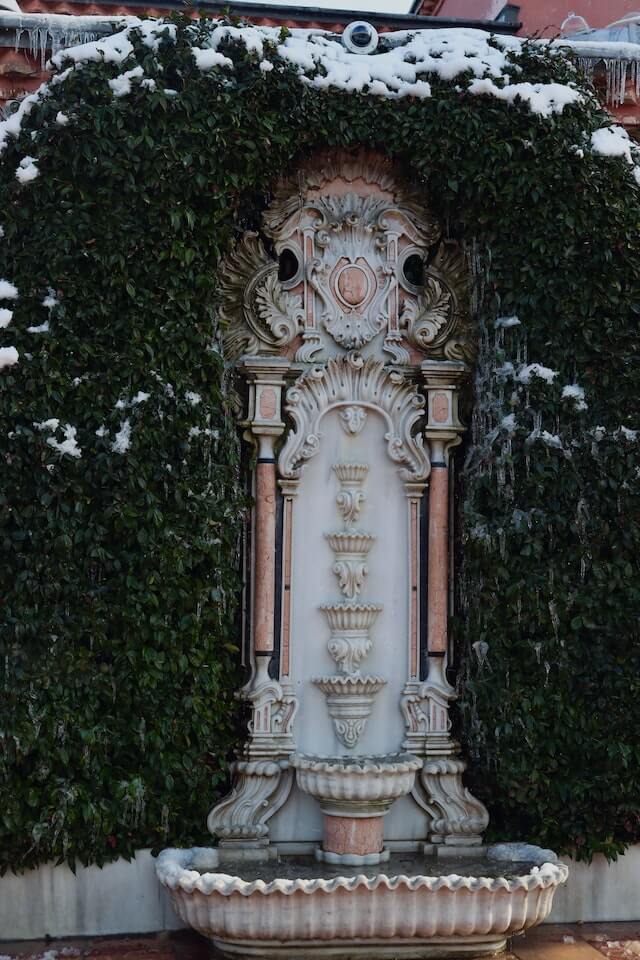It is very important for you to protect your cast stone fountain and birdbath from the freeze-thaw cycle during the winter months. Cast Stone fountains and décor that can collect water, should not be left outside when temperatures dip down to freezing. Any cast stone component that can hold water and freeze has the potential to crack and crumble. Components such as fountain pedestals which remain in a basin/pool can also crack or crumble. Ideally a fountain should be stored indoors or in a dry protected place such as a covered porch or garage that is away from the elements. Great collectibles of fountains and birdbaths in the US brought to you by Outdoor Art Pros.

If you are unable to bring your fountain indoors, follow the following tips:
- Remove the pump, drain pipes, stoppers, finials, and other smaller components and store inside. The stoppers and/or drain pipes are removed to allow moisture to drain in the event water gets into the basin.
- It is recommended that you raise the fountain base or any garden accent that will be left outdoors, from the ground. Use wood strips so the base does not freeze to the ground surface. Store fountain finials and other small components indoors.
- Use old blankets and towels inside the bowls to absorb any moisture. Properly dry out the fountain including all crevices. It is strongly recommended to cover your cast stone fountain with a waterproof fountain cover. If you do not have a fountain cover, you can cover your fountain or birdbath with waterproof plastic. It is essential that you make sure that moisture will not accumulate in the basin or other fountain components and freeze.
- Make sure that this plastic will stay on the garden accents by securing it with rope or other material. If you are using a cover, make sure it fits properly and is taut. This ensures that snow and water will not pool on the fountain cover.
- It is important to check the fountain periodically to make sure the plastic and/or cover is secure and water is not accumulating in any fountain components.
How to stop a bird bath from freezing?
During the winter months, supplying fresh water for birds is crucial to keep them healthy. However, birds rely on melting snow and ice to get water, which can be an energy-intensive process. Drinking frozen water can also slow them down and make them vulnerable to predators. To help the local bird population, it's important to keep your bird bath from freezing. Follow our tips to provide birds with a source of water and help them conserve vital energy and warmth.
Use a bird bath heater: A bird bath heater is a device that keeps the water in your bird bath from freezing. It is equipped with a thermostat that turns on at 32 degrees and turns off when the temperature rises above freezing.
Add warm water: If you don't have a bird bath heater, you can add warm water to your bird bath to prevent it from freezing. However, you should avoid using boiling water as it can crack the bird bath.
Insulate the bird bath: You can insulate your bird bath by placing it in a sheltered area or covering it with an insulating material like a blanket or tarp. This will help to retain the heat and prevent the water from freezing.
Clean the bird bath regularly: Clean your bird bath regularly to prevent debris and dirt from accumulating in the water. This will help to keep the water from freezing.
By following these tips, you can provide birds with a source of water during the winter season and help them conserve vital energy and warmth.

What to do if your cast stone fountain cracks or starts to flake?
If your cast stone piece cracks or starts to flake, it is important to address the issue as soon as possible to prevent further damage. The first step is to clean the damaged area and remove any loose material. Then, assess the severity of the damage to determine the best course of action. If the damage is minor, you can use a patching compound to fill in the cracks or flakes. For more significant damage, it may be necessary to hire a professional to repair or replace the piece. It's important to note that attempting to repair the damage yourself without the proper knowledge and tools can potentially make the problem worse. To prevent future damage, it's recommended to regularly clean and maintain your cast stone pieces, and to protect them from harsh weather conditions.
Maintaining Your Fountain
Maintaining your fountain during the winter is just as important as maintaining it during the rest of the year. Freezing temperatures and harsh weather can cause damage to your fountain if not properly cared for. To protect your fountain during the winter, it's important to drain the water and cover it with an insulating material. Regularly checking for any damage or issues and addressing them promptly can also help prevent further damage. Don't let the winter weather damage your fountain - take action today to properly maintain it and ensure it stays in top condition.
Concrete, including cast stone concrete, is slightly porous. This allows moisture to absorb into the fountain. In freezing temperatures, this moisture can freeze. Since there is very little room to expand, the moisture can cause small cracks or chips. It can also lead to the paint peeling. Don't forget to look at some of our other guides such as the WINTER CARE- GLAZED AND TERRA COTTA POTTERY and the WINTER CARE- CAST STONE PLANTERS AND STATUARY.

